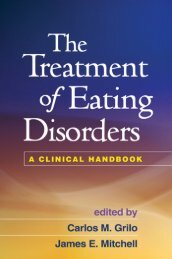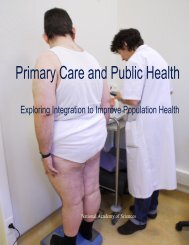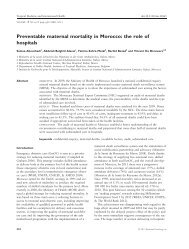Preventing Childhood Obesity - Evidence Policy and Practice.pdf
Preventing Childhood Obesity - Evidence Policy and Practice.pdf
Preventing Childhood Obesity - Evidence Policy and Practice.pdf
Create successful ePaper yourself
Turn your PDF publications into a flip-book with our unique Google optimized e-Paper software.
CHAPTER 9<br />
<strong>Obesity</strong> p revention in e arly c hildhood<br />
Ladda Mo - suwan 1 <strong>and</strong> Andrea M. de Silva - Sanigorski 2,3<br />
1 Department of Pediatrics, Faculty of Medicine, Prince of Songkla University, Hat Yai,<br />
Songkhla, Thail<strong>and</strong><br />
2 WHO Collaborating Centre for <strong>Obesity</strong> Prevention, Deakin University, Geelong, Australia<br />
3 Jack Brockoff Child Health <strong>and</strong> Wellbeing Program, McCaughey Centre, Melbourne<br />
School of Population Health, The University of Melbourne, Melbourne, Australia<br />
Summary <strong>and</strong> recommendations<br />
for practice<br />
• Early childhood is a critical period for obesity prevention.<br />
However, prevalence in preschool children<br />
is increasing.<br />
• Early childhood settings (home, day care, kindergartens)<br />
have an important role in facilitating health<br />
promoting behaviors <strong>and</strong> healthy weight in young<br />
children.<br />
• Further evidence is needed to determine the effectiveness<br />
of those behavioral interventions during<br />
pregnancy, those that promote breastfeeding <strong>and</strong><br />
those that are family - based on preventing childhood<br />
obesity. However, these approaches hold promise.<br />
• Behavioral interventions delivered through child<br />
care services have also shown some effectiveness on<br />
behaviors. However, reduced unhealthy weight gain<br />
was not achieved in most cases.<br />
• The effectiveness of interventions with an environmental<br />
focus is also limited. However, these<br />
interventions hold great promise for creating environments<br />
to support healthy eating <strong>and</strong> physical<br />
activity <strong>and</strong> to shift social norms related to policies<br />
<strong>and</strong> practices in early childhood services.<br />
• Despite promising results, further trials are needed<br />
to determine the best strategies for obesity prevention<br />
in the early years of life.<br />
<strong>Preventing</strong> <strong>Childhood</strong> <strong>Obesity</strong>. Edited by<br />
E. Waters, B.A. Swinburn, J.C. Seidell <strong>and</strong> R. Uauy.<br />
© 2010 Blackwell Publishing.<br />
Introduction<br />
Recent reports from several countries have documented<br />
an increase in the prevalence of obesity among<br />
preschool children. 1 – 5 With its associated co - morbid<br />
conditions 6 <strong>and</strong> likelihood of persistence into adulthood,<br />
7 these trends pose a remarkable burden in terms<br />
of young children ’ s health <strong>and</strong> present <strong>and</strong> future<br />
health care costs. Therefore, the need to identify effective<br />
prevention of overweight <strong>and</strong> obesity among<br />
young children is urgent before a level of public health<br />
crisis is reached.<br />
The importance of early child care settings — home/<br />
family, day care, kindergartens — in shaping children ’ s<br />
dietary intake, physical activity <strong>and</strong> energy balance,<br />
<strong>and</strong> consequently in combating the childhood obesity<br />
epidemic has been documented in a recent review 8 <strong>and</strong><br />
Chapter 30 . The role of the home environment<br />
<strong>and</strong> parental dynamics in the development <strong>and</strong><br />
maintenance of children ’ s healthy behaviors is multi -<br />
factorial. In addition, parental roles in preventing<br />
obesity change as their children move through critical<br />
developmental periods from before birth. 9 An unfavorable<br />
pre - natal environment (e.g., maternal undernutrition<br />
or overnutrition, smoking <strong>and</strong> diabetes<br />
mellitus) increases a future risk of developing obesity<br />
in the offspring. 8,10 During infancy, dietary factors such<br />
as the extent <strong>and</strong> duration of breastfeeding, 11 – 16 <strong>and</strong> the<br />
nutrient content <strong>and</strong> timing of introduction of complementary<br />
foods, 17,18 have been found to be associated<br />
with an increased risk of obesity in later childhood.<br />
Toshcke et al 19 demonstrated that a combination of low<br />
71

















